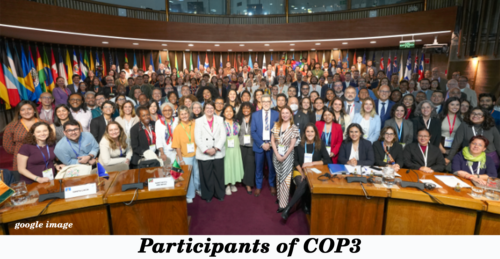by Kristen Ku
BELIZE CITY, Tues. May 14, 2024
Belize emerged as a key participant in the third meeting of the Conference of the Parties (COP 3) to the Regional Agreement on Access to Information, Public Participation, and Justice in Environmental Matters in Latin America and the Caribbean, known as the Escazú Agreement.
The conference, which took place from April 22-24 at the headquarters of the Economic Commission for Latin America and the Caribbean (ECLAC) in Santiago, Chile, brought together over 700 in-person attendees and many more online.

Today, elected representatives of the public for the Escazú Agreement for the Caribbean— Bishnu Tulsie (Saint Lucia), and Nicole Leotaud (Trinidad and Tobago), shared a report from the conference.
They stated that during COP 3, the 15 States Parties, including Belize, approved a comprehensive Action Plan on Human Rights Defenders in Environmental Matters. This plan, structured to be implemented over six years (April 2024 to April 2030), aims to establish a safe environment for environmental defenders, ensuring they can operate free from threats and insecurity.
Marcelo Cousillas, Director of Legal Affairs at Uruguay’s Environment Ministry and Chair of the Presiding Officers of the Escazú Agreement, stated the importance of this action, noting that Latin America and the Caribbean have been particularly dangerous for environmental defenders, with three out of every four of the nearly 2,000 global murders of environmental defenders in the last decade occurring in this region.
Belize, along with six other Latin American/Caribbean countries—Ecuador, Argentina, Saint Lucia, Mexico, Uruguay, and Chile—presented its national plan at the conference. This plan, currently in development, focuses on strategies for effective and progressive implementation of the Escazú Agreement.
There was discussion on the importance of widely announcing the foundation of the Agreement, updating and addressing internal regulations, and coordinating efforts among various institutions and stakeholders involved.
For context, the action plan approved at COP 3 is divided into four priority areas:
- Knowledge Creation: Increasing awareness and sharing information about the rights and roles of environmental defenders.
- Recognition: Publicly acknowledging the contributions of those who promote and defend human rights in environmental matters.
- Capacity-Building and Cooperation: Enhancing the formulation and implementation of relevant laws, policies, and measures at various levels.
- Evaluation, Follow-Up, and Review: Ensuring transparency and accountability through strict measures for the action plan’s evaluation and review.
The final day of the 3-day conference included special sessions on access to justice in environmental matters—a significant challenge in Latin America and the Caribbean—and the importance of ensuring optimal public participation in environmental impact assessments.
The conference also covered the mandate of the current Presiding Officers of the Conference, which was renewed for another two years. It was decided that Uruguay would continue as Chair, and Antigua and Barbuda, Argentina, Mexico, and Saint Lucia as Vice-Chairs.
Additionally, the States Parties approved a draft decision to integrate and strengthen the gender perspective in the Escazú Agreement’s implementation, encouraging full participation of women, including indigenous women, in environmental governance.
Other key reflections and decisions from the conference included:
- Creating designated spaces within the COP for indigenous peoples and youths.
- Committing resources to support the immediate implementation of the Action Plan.
- Advocating for the universal recognition of the right to a healthy, safe, and sustainable environment.
The fourth meeting of the Conference of the Parties to the Escazú Agreement is scheduled for April 22-24, 2026, at ECLAC’s headquarters in Santiago, Chile.

